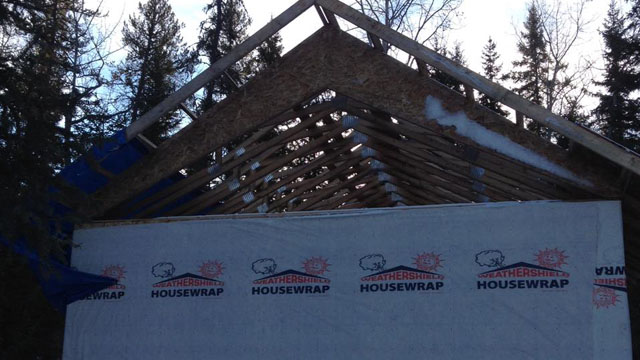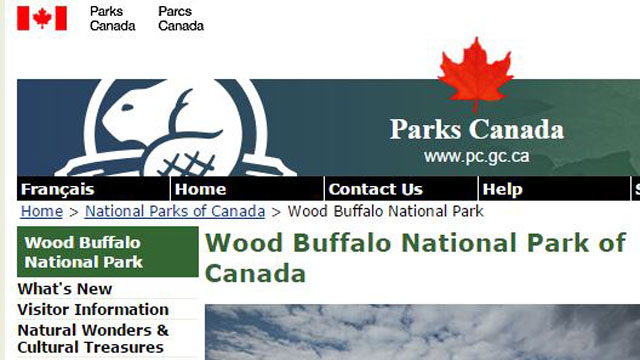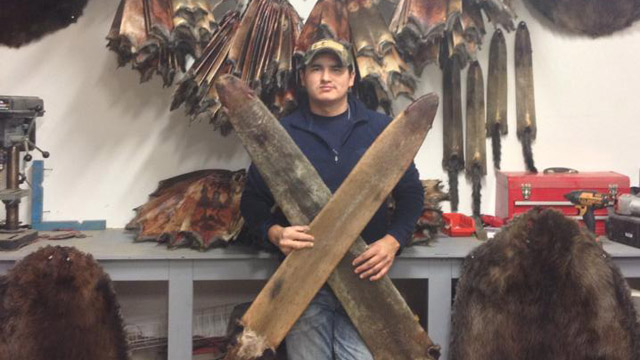Robert Grandjambe Jr says Parks Canada tore down a hunting cabin on his traditional trap line
Brandi Morin
APTN National News
Robert Grandjambe Jr. lives to hunt, fish, trap and practice the traditional lifestyle of his ancestors. The 31 year old has been doing it since he was a young boy. And it’s a legacy the Mikisew Cree man from Fort Chipewyan, Alta., is determined to carry on as long as he can.
“It’s a gift,” said Grandjambe. “Living off the land, being healthy, maintaining a culture and giving food to the elders, giving back to my community.”
Grandjambe is the real deal. He knows the ways of the land and life within the land. Sometimes for weeks at a time, he will descend into the woods via sled and dog team to hunt for the likes of Martin fox, wolverine, wolf, lynx, fisher, beaver, muskrat or any kind of fur bearing animal he can find living in the boreal forest.
He recently started hunting in a new area, located within his trap line group of 1204, and started to put down permanent roots to accommodate his aims.

But in December, Parks Canada tore down the frame of the hunting cabin he was constructing along Pine Lake in the Wood Buffalo National Park.
It’s an area that happens to sit in the traditional lands of Treaty 8.
Grandjambe said he got a call from a Park employee telling him to check his email.
He was shocked to learn the access to his cabin had been blocked, the cabin torn down, fifth wheel trailer and building materials suddenly gone.
For months prior, he said he had been trying to negotiate with the Park, which along with the nearby Salt River and Smith’s Landing First Nations, had expressed opposition to the location of the cabin.
But communication broke down, on every end.
In a letter addressed to Grandjambe in August 2015, Parks Canada gave several reasons stating its concerns with the cabin’s location. They included the fact the cabin was beside a recreational trail, was adjacent to a popular swimming beach and public recreation facility, restrictions on harvesting within 800m from the lake and his lack of consultation with the two nearby First Nations.
Grandjambe belongs to the 1204 trap line in which boundaries extend to Pine Lake. It’s an area that was set apart by the Canadian government for First Nation families to hunt and trap in long before he was born.
According to Matthew Lepine, leader of the 1204 trap line who lives near Pine Lake, it was an ideal location to build a cabin because it was in his trap line area and near a fresh water source to house him during the hunting/trapping seasons.
“Robert’s every right to build a cabin in there!” said Lepine. “I’m a land user. I’m an elder. I’m trying to figure out why they’re trying to defy this one fella who is trying to keep our tradition of trapping alive. This is crazy. It’s our traditional land and we want to use it and we want to stay there.”
Lepine said Treaty rights should take precedent and believes the situation is a symptom of a longer, on-going issue.
“When you go back years, they’ve (government) always been trying to get rid of the Aboriginal people from the park. They think, ‘If we get rid of them, we’ll have the whole park to ourselves’,” said Lepine.
Grandjambe agrees.
“Our Treaty rights super cede their regulations. Indigenous Peoples always managed our own lands. Why is Parks Canada manipulating and telling us what to do? They can call it a recreational trail but who was here first? Was it the hikers or was it the First Nations?”
First Nation, Métis Nation and Inuit people aren’t permitted to have a recreational cabin on the lake, but are allowed to have a hunting cabin in the park. But there are numerous recreational cabins situated around the lake owned by non-Aboriginal people and Grandjambe doesn’t understand why he isn’t allowed to have one too.
“The locals (Aboriginals) from the area are unable to purchase or establish the cabins. I scratch my head- I have to relocate? They don’t want Indigenous people in that part of the territory. It’s a recreational area. It’s for friends, families and relatives of Parks staff that own these cabins and they want it for their own recreational pleasures,” said Grandjambe.
Parks Canada said they do recognize individual Treaty harvesting rights and that harvesting cabins can be, in certain circumstances, incidental to those harvesting rights.
“But the issue at play here is the location of the harvesting cabin,” said Park warden Stuart Macmillan. “In order to manage the park, we zone areas of the Park for certain uses. A very small portion of the park is zoned for recreational use. It amounts to less than 1 per cent. Where Robert chose to build his harvesting cabin wasn’t compatible to that area.”
He said they don’t view the situation as violating Treaty rights because ninety-nine per cent of the park is available for exercising Treaty rights.
“This is where consultation comes in. We have a cabin application process which we use to facilitate consultations with Aboriginal groups around the park. Through this process we address issues that may arise with respect to the exercise of Treaty rights,” said Macmillan.
He said Park officials made numerous attempts to engage with Grandjambe and didn’t receive a response. The Park offered alternative locations for Grandjambe to consider building a cabin.
“It would’ve been much better for us to have worked together. For Robert to have come and worked with us from the outset. Unfortunately, Mr. Grandjambe did not engage us in that process.”
However, Grandjambe and Lepine both dispute the claim and other than a few telephone conversations between Grandjambe and Park officials, said they both weren’t properly engaged by Parks Canada.
Grandjambe said his Chief, Steve Courtorielle showed support for him leading up to the cabin removal but hasn’t heard from him since it was tore down.
Chief Courtorielle did not respond to APTN National News request for comment on the matter.
Grandjambe said he thinks the Smith Landing and Salt River First Nation may have had personal motives for backing the Parks removal of his cabin. His uncle, whose son is the Chief of Smith Landing also has a trap line in the area, and Grandjambe said he doesn’t want others encroaching near his territory.
In the meantime, Grandjambe’s building material and trailer is being held in storage in Fort Smith. Parks Canada said he is free to pick them up anytime.
But for now, Grandjambe is weighing his options. He is determined to stand up for his rights while struggling to keep a lifestyle that is now a rare kept endeavour, alive.
“As Indigenous people we have to stand up and we have to figure out, like stop taking it from the government,“ he said. “We have to govern our territories. The genesis of it all…it’s happened for as long as I can remember with Parks Canada, it’s really manipulating.”
And he won’t stop hunting, trapping and utilizing the abundant resources of the land while he’s waiting.
“I can’t stop hunting. I want to sustain myself and be an example. It’s healthy, it’s a good lifestyle.”
One day when he has a family of his own he hopes to pass on the knowledge to the next generation.
“If you want to keep our culture and keep a society alive that is genuine and pure and back to our traditional roots,” he said.












